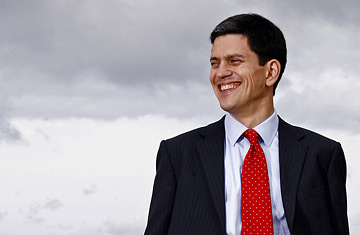
David Miliband, British Foreign Secretary
Military pilots approaching bases in hostile territory "go tactical" to evade possible ground fire, changing altitude without warning and at insane speeds or making crazy looping diversions. Suffering such white-knuckle flying experiences has already become part of the job for David Miliband, Britain's Foreign Secretary for barely a month, as he traveled to Afghanistan and headed south to Helmand province to meet British troops stationed there. Miliband's purpose was to signal Britain's continued commitment to securing and rebuilding Afghanistan by making the country his first long-haul destination in his new job. He returns to Britain on Friday after a stop in Pakistan, and then on Sunday boards another long-haul flight — to Washington, where he'll meet with Secretary of State Condoleezza Rice while Britain's new Prime Minister, Gordon Brown, goes to Camp David for his first official powwow with President Bush.
To many, Miliband's arrival as an international power broker may seem like something of a tactical landing. After all, Miliband, who turned 42 this month, has been a Member of Parliament only since 2001 and a Cabinet Minister for just over two years. His supersonic ascent in the corridors of power has gone largely undetected outside Britain, despite a brief bout of notoriety when Labour Party colleagues tried to persuade him to stand against Brown for the party leadership earlier this year. He refused, and now arrives for a Sunday dinner and Monday's meeting with Secretary of State Rice as Britain's second-youngest-ever Foreign Secretary.
His may be an unfamiliar face in America, but it's a country he knows well. He attended junior high school in Massachusetts, and later studied at MIT. "It'll be strange to go to the U.S. as Foreign Secretary of the U.K. rather than as a schoolboy," Miliband told TIME on a jet from Kandahar to Islamabad. In shirt-sleeves (a pink, Banana Republic shirt) and after discarding the body armor recommended by the captain until the plane had reached 20,000 feet, Miliband still looked more schoolboy than international statesman. But Rice will find him anything but juvenile in his approach to his new job.
"British foreign policy is not just about what we do, but about why we do it," he says. "People judge you by your actions, but also by your motivations. They can only know your motivations if you explain them." That's something he was at pains to do during his progress through Afghanistan and Pakistan, as his interlocutors criticized Britain's closeness to the U.S. and questioned its military involvement in Helmand and in Iraq, and London's commitment to reviving the Middle East peace process.
Many Britons had hoped that Tony Blair's departure would herald a shift away from their government's unswerving public support for the Bush Administration. The first weeks of the Brown government gave them some cause for optimism. Miliband himself has a reputation as a skeptic on Iraq and was a critic of last year's Israeli invasion of Lebanon. A July 12 speech in Washington by the new Secretary of State for Development, Douglas Alexander, was interpreted as a veiled criticism of U.S. foreign policy. And Lord Malloch Brown, appointed by Brown as a Foreign Office minister — and a pet hate of some American neocons during his tenure as Deputy Secretary General of the U.N. — told a British newspaper, "It is very unlikely that the Brown-Bush relationship is going to go through the baptism of fire and therefore be joined together at the hip like the Blair-Bush relationship was."
"Blair's position was too close, and now they have to find a way of getting some distance without causing a rift," says Georgetown professor and Council on Foreign Relations senior fellow Charles Kupchan. "If you read between the lines, I would say this is a government that hasn't made up its mind yet, but it is safe to say there will be more distance between Washington and London than there has been since Sept. 11."
Not so, says an emphatic Miliband, who has rejected manifold opportunities to play to the gallery in Britain and elsewhere by so much as hinting at a cooling of relations with Washington. "Our relationship with the U.S. is our single most important bilateral relationship. It's as important under this government as it was under the last government. There are certain shared values but also from our point of view the recognition that America is the world's largest economy and the world's largest military power as well." He adds: "There's not a single anti-American in the U.K. government."
Two days from now, Washington will get a firsthand glimpse of a man who is not only unequivocal in promoting U.S.-U.K. relations, but even admits to being a Red Sox fan. "If you lived in Boston, you of course support the Boston Red Sox," Miliband told TIME, "but they failed to break their World Series duck while I was there." Not everyone in the U.S. will realize that by "duck," Miliband means the cricket term for failure to score. But for the most part, the new Foreign Secretary promises to speak in language the U.S. government understands and appreciates.
—With reporting by Brian Bennett/Washington
